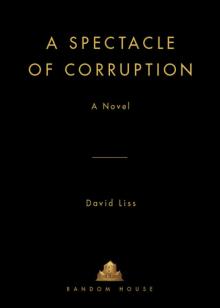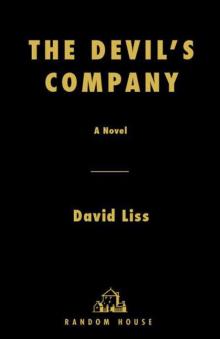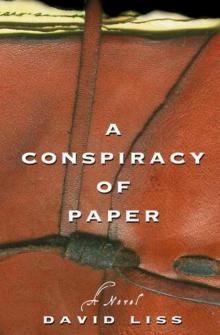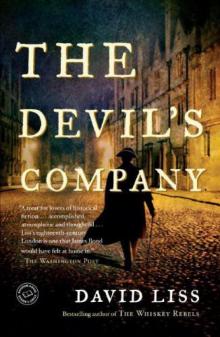- Home
- David Liss
The Coffee Trader Page 4
The Coffee Trader Read online
Page 4
Miguel felt himself tense. A man lurking in the shadows awaiting him could never be good news. More than once he’d been spirited away to some dank tavern cellar by an angry creditor who kept him there as prisoner until he could send for the money he owed or—and this was more likely to happen—he could talk his way out of imprisonment.
Then another thought crossed his mind. Those strange notes he had been receiving. I want my money. He felt his skin prickle.
“Did you see who it is?” he asked Nunes.
“I caught a quick glimpse, and unless I miss my guess it is Solomon Parido.”
Miguel stole a look toward the exit and saw a figure step toward the dark. “Christ’s tabernacle. What does he want?” The parnass had been his enemy since an unfortunate incident two years earlier, which had ended with his withdrawing his offer to wed his daughter to Miguel.
“Nothing good, you can depend on that. A parnass lying in wait is always bad news, and Parido is worse news than most. And Parido lying in wait for Miguel Lienzo—well, it is hard to think of a more dire situation. To be honest, I hate for him to see us together. I have troubles enough without a parnass looking into my affairs too deeply.”
“You have no troubles at all,” Miguel said darkly. “I should lend you some of mine.”
“Your brother does business with him, doesn’t he? Why don’t you have him ask Parido to leave you alone?”
“I think my brother encourages him, frankly,” Miguel said bitterly. It was bad enough that he was dependent upon his younger brother, but Daniel’s friendship with the parnass particularly unnerved him. He could never quite shake the feeling that Daniel reported everything Miguel said or did.
“Let’s go back inside,” Nunes suggested. “We’ll wait for him to pass.”
“I won’t give him that satisfaction. I’ll have to take my chances, but I don’t think your performance has fooled anyone. We should break your toe in earnest. If he wants to examine your foot, you’ll be found guilty of having lied in the synagogue.”
“I’ve put myself at risk for your sake. You ought to show some gratitude.”
“You’re right. Should he inspect your toe and find it whole, we’ll tell him that a great miracle happened here.”
They hobbled out to the courtyard and, though he meant to restrain himself, Miguel couldn’t help but look to the corner where he had seen Parido lurking. But the parnass was already gone.
“Parido lying in wait for you is bad enough,” Nunes observed, “but spying on you and disappearing into the shadows—that is something altogether more terrible than I had thought.”
Miguel had fears enough without having his friend fan the flames. “Soon you will tell me that a quarter moon makes things worse.”
“A quarter moon is a bad omen,” Nunes agreed.
Miguel let out a raspy noise, half chortle, half cough. What did the parnass want from him? He could think of no religious laws he’d openly violated in the recent past, although he might have been seen on the street with Hendrick. Still, inappropriate contact with gentiles hardly warranted this kind of surveillance. Parido had something else in mind, and while Miguel could not think what it might be, he knew it was nothing good.
from
The Factual and Revealing Memoirs of Alonzo Alferonda
My relocation to Amsterdam proved, at first, to be all I could have hoped for. After wallowing too many years in the squalid mud of London, that putrid capital of a putrid island, Amsterdam seemed to me the cleanest and most beautiful of places. England had become a disorderly nation, with its revolutions and regicide. While living there I had the chance to meet a man called Menasseh ben Israel, who came from Amsterdam to convince England’s warrior-priest king, Cromwell, to allow English Jews to make a home there. Menasseh painted a picture of Amsterdam that made it sound like the Garden of Eden with red-brick houses.
In my early days there, I was inclined to agree. The local Ma’amad, the ruling council of Jews, warmly embraced newcomers. It arranged for kind strangers to take us in until we could find a place of our own. It at once assessed our understanding of the customs and holy laws of our race and began training us in those areas in which we showed ignorance. The Talmud Torah, the great synagogue of the Portuguese Jews, offered the opportunity for study at all levels of understanding.
I arrived in Amsterdam with a few coins in my purse and could afford to establish myself in business, though I did not yet know what business I would make my own. However, I soon discovered something to my liking. On the Exchange a new form of commerce had emerged, that of buying and selling what no one owned and, indeed, what no one ever intended to own. It was a gambling sort of trade called futures, in which a man wagered on whether the price of a commodity would rise or fall. If the trader guessed correctly, he would earn far more money than if he had bought or sold outright. If he guessed incorrectly, the cost could be formidable, for he would not only lose the money he had invested, he would owe for the difference between what he had bought and the final price. I saw at once that this was no trade for the timid or even for the merely brave. This was a trade for the lucky, and I had spent my life learning how to manufacture my own luck.
I was not alone in doing so. Throughout the Exchange were groups called trading combinations, and they would manipulate markets as best they could. A combination might circulate a rumor that it intended to buy, let us say, British woolens. The Exchange, hearing that a large group of men planned to buy, would respond, and the price would rise accordingly. All along, however, the combination intended to sell, and once the woolens reached a rewarding price, the combination would react accordingly. These organizations, my astute reader will see, engage in a tricky business because these men will have to do as they pretend most of the time; otherwise rumors surrounding their movements will never be believed.
I soon found myself something of a purveyor of rumors. I would make commodities do pretty little dances as I saw fit, and I had a knack for disguising my footprints as I did so. Check the dice if you wish, dear sir. You will see that they are but ordinary. A word dropped here, a rumor spread there. Not by me, of course, but done all the same. This commodity bet on, this one bet against. It all proved a handy little trade.
Shortly after my arrival in the city I found myself passing idle hours in a little gambling establishment owned by a fellow called Juarez. Gambling was strictly forbidden by the Ma’amad, but many forbidden things were, in truth, tolerated, so long as they were done quietly. Juarez ran a tasteful little tavern that catered to Portuguese Jews. It offered food and drink that conformed with our holy laws, and he permitted no whores to ply their trade, so the parnassim chose not to bother him.
I played cards there with, among other men, a merchant some ten years my senior named Solomon Parido; he disliked me and I disliked him. Why should that be? I cannot say for certain. There was no initial slight that began it, no wrong left to be revenged. It is sometimes so simple as two men having natures that cannot stand to be near each other, like magnets that push each other away. I found him too sour; he found me too ebullient. Though our work and worship often threw us together, neither was ever happy to see the other. We might be in the same room, and for no reason he would scowl at me and I would smile saucily in return. He might make some reference to cheats, meaning to needle me for my background; I would return a reference to idiots, knowing that his only son had been born deficient of mind.
Perhaps you will say, Alferonda, you are cruel to mock a man for his misfortune, and surely you would be right to say so. It is cruel, but Parido brought forth the cruelty in me. Perhaps had he been kinder I would have looked upon him compassionately. I might then have seen his wealth—his massive house full of rugs and paintings and gold trinkets, his indulgent coach-and-four, his maneuvers on the Exchange that succeeded simply because of the sheer volume of capital propping them up—as some small compensation for his domestic sadness. I might have looked at his expensive clothes as a mask behind which he coul
d hide his melancholy. I might have viewed his lavish banquets—indulgent affairs with dozens of guests, barrels of wine, wheels of cheese, herds of roast cattle—with new eyes, for I would have been a guest at those banquets and seen what satisfaction he took in playing host. But I never received the handsomely inscribed invitations to Parido’s house. My friends did, I can assure you, and I listened to the tales of their delight. But Parido could find no place for Alferonda in his magnificent house. Why, then, should Alferonda make room in his equally magnificent heart?
One night fate placed the two of us together at a game of cards. I’d had more wine than a gambling man ought, and seeing Parido showing a pleasant face to every man at the table but me, I was unable to resist the urge to cheat him, if just a little.
If a man cheats at cards to win for himself, he is bound to raise the suspicions of all. But if he cheats at cards for no reason other than to make another man lose, he is likely to find more allies than enemies. The more Parido regarded me with disdain, the more I saw to it that the cards did not turn the way he wished. The suit or the number he longed for would find its way to another man’s hand or, if I was desperate, in my sleeve. Moments when he thought all would go his way burst like flimsy bubbles. More than once he cast a suspicious look in my direction, but I had only modest winnings to show for myself. How could I be responsible?
I suppose this might have come to nothing if it had ended there. He lost a few guilders that night, but nothing of consequence. A man like Parido knows never to bring more to the table than he is prepared to lose as the price of an evening’s entertainment. A few months later, however, matters took another turn.
I knew Parido and his trading combination planned a maneuver with Setúbal salt. The price had been depressed for some time, so exports had been reduced. They were therefore due to rise, and Parido’s men wanted to effect that rise themselves rather than be taken by surprise. I caught wind of this from a tavern keeper—one of the many I paid for such information—and saw an opportunity to profit for myself. I want to be clear that I never engaged in any action simply for the purpose of stinging Parido. I did not much like him, nor he me, but that mattered for little when it came to trade. I did what I did to earn a profit. It was nothing more than that.
Parido’s combination began to spread the tale that the latest shipments of Setúbal salt were selling for a much higher price than had been anticipated. By doing so, they hoped to spark a buying frenzy upon the Exchange of those wishing to secure the current low price. Thus they intended to profit from the salt they had themselves acquired and from their puts: wagers that the price would rise. When they began to sell their salt at the new price, I and my agents sold as well, flooding the market in order to capitalize on the price differential. My method enabled me to exploit their scheme for some fair gains. It also had the unavoidable side effect of making their trade unprofitable, and their puts ended up costing them a slightly more than insignificant amount. But that is the price they had to pay for their trickery.
I was always certain to hide myself behind strange and unknown brokers when I attempted these sorts of maneuvers, but Parido prided himself on being mightily well connected, and he found me out. The next day he came up behind me on the Exchange. “You’ve crossed the wrong man, Alferonda,” he said.
I said I knew nothing of his complaint. My father had always told me to deny everything.
“Your lies don’t impress me. You’ve profited from ruining my scheme and costing me money, and I’ll see to it that you get what such a low trickster deserves.”
I laughed off these threats as I had laughed off others. Indeed, as the months and even years passed, I forgot his words. He didn’t much like me, he spoke ill of me when he could, but never that I knew did he act against me in matters of consequence. It could have been, I realized, that he acted against me in any of a number of trades that went bad, but that might have been fate, and I tended to believe that he would not have been shy about taking credit for any harm he might send my way.
But then he was elected to the Ma’amad. As both a wealthy merchant and a parnass, he possessed as much power as was possible for a man in our community. I had no reason to celebrate his election, but I had no reason to suspect that he would use his new position to attack me so ruthlessly.
3
Down in the kitchen, Hannah nearly severed her thumb as she chopped asparagus. She’d not been paying attention, and the knife, which had grown dull under months of the maid’s inattention, slipped easily from her grasp and dug into her flesh with amputating force. But the same dullness that made the blade dangerous rendered it impotent, and the wet metal barely broke her skin.
Hannah looked up to see if Annetje had noticed. She hadn’t. The girl was busy grating cheese, humming some drunken ditty to herself—appropriate enough since she’d been dipping into the wine again. If she’d noticed Hannah’s mishap, she’d certainly have said something: Oh, look how clumsy you are or What a fine thing that can’t handle a knife. She would say it with a laugh and a turn of her pretty head, as though a laugh and a turned head made everything amicable. Hannah would let her pretend that it did make everything amicable, though she’d be biting back the urge to slam the half wheel of cheese into the girl’s face.
Hannah stabbed at the drop of blood with her rigid tongue and pushed the asparagus into the bowl, where it would be mixed with the cheese and some old bread and baked into a flan like they had eaten in Portugal, except in Lisbon they had used different vegetables and different cheeses. Annetje thought flans were disgusting—unwholesome, she said, a term she used to describe any food she hadn’t eaten growing up in Groningen.
“Someday,” she was now observing, “your husband will notice that you fix elaborate meals only when his brother plans to dine with you.”
“Two people don’t eat much,” Hannah answered, almost successfully willing herself not to blush. “Three people eat a great deal more.” That was something her mother had taught her, but it was particularly true when her husband was involved. If Daniel had his way, they’d eat nothing but bread and old cheese and pickled fish, anything they could get cheaply. And he was the one who insisted that they make something of the evening meal when his brother joined them, probably so that Miguel wouldn’t think Daniel a miser—which he already did.
But she also liked to feed him well. Miguel did not eat properly when left to himself, and she did not like him to go hungry. Also, unlike Daniel, he always appeared to relish his food, to regard it as a pleasure rather than a mere necessity that kept him alive for one more day. He would thank her and praise the quality. He went out of his way to say little meaningless things to her, observing that the added nutmeg in the herring made the dish sparkle or that the prune sauce she served over the eggs was more delicious than ever.
“The carrots need to be stewed in the prunes and raisins,” Annetje said, seeing that Hannah had taken a moment to rest.
“I’m tired.” She sighed to emphasize her point. She hated pleading weakness to the girl, but she was with child now, and that ought to be excuse enough. It ought to be, but there was nothing to be gained by thinking about what ought to be. It ought to be, for example, that the wife of a Portuguese hidalgo was not in a hot and nearly windowless kitchen chopping asparagus with her maid. Still, that was what he asked of her, and that is what she would do. She took grim pleasure in keeping his house in order, in making herself blameless in his eyes.
After their move to Amsterdam, Daniel had allowed her to hire a houseful of servants, but within weeks he had learned it was the Dutch custom for wives, even the wives of the greatest heren, to share their labors with their maids. A house with no children never had more than one servant. Eager to save his money, Daniel had dismissed nearly everyone, keeping just the girl, whom he favored because she was a Catholic, to help Hannah with her chores.
“You’re tired,” Annetje repeated sourly. Then a shrug.
Hannah knew only a passable amount of Dutch, a
nd Annetje less Portuguese, so their interactions were often terse and limited. Not limited enough. Hannah—fool, fool, Hannah—had trusted the girl too much in those early days. She’d trusted her pretty smile and her sweet temper and sea-green eyes. In the hours they spent together, toiling like equals—scrubbing walls, washing the stoop, sweating puddles onto the kitchen floor—Hannah had come to like the girl and to confide in her. Annetje taught her as much Dutch as Hannah could learn, and she tried patiently to learn Portuguese. She taught Hannah how to scrub the front stairs of a house (which no one had ever done in Lisbon), how to pick the best produce from the merchants on the Dam, and how to tell if a baker added chalk to whiten his bread.
Hannah had come to look on the girl as her only true ally. She found few friends among the other Jewish women of the Vlooyenburg, and she hardly had time for idle friendship with her chores. Floors to scrub, clothes to launder, meals to cook. Breakfast before dawn, dinner when Daniel returned home from the Exchange—anywhere between two and six, so it had always to be ready—and later, depending on when he had his dinner, a light supper. There were the Sabbath meals he hosted, and the havdalah gatherings. Sometimes when he invited friends or colleagues for meals, he would supervise as Hannah and Annetje prepared the food, making foolish suggestions and getting underfoot.
Hannah had never been made to do so much work in her life. In Lisbon she’d been asked to sew and mend and to help cook on the holidays. She’d minded children for older relatives, and she’d cared for the sick and the elderly. Nothing like this. After a week, Annetje had found her huddled in the corner, weeping so hard she could hardly keep from banging her head against the brick behind her. The girl had pleaded for her to say what was wrong, but where to begin? What was wrong? Amsterdam. Jews. Prayer. Synagogue. Cooking. Scrubbing. And Daniel. It was all wrong, but she could say none of it aloud, so she’d let the girl comfort her and bring her hot wine and sing songs to her as though she were an infant.

 The Whiskey Rebels
The Whiskey Rebels Renegades
Renegades The Twelfth Enchantment: A Novel
The Twelfth Enchantment: A Novel The Day of Atonement
The Day of Atonement The Devil's Company
The Devil's Company Randoms
Randoms Paleo / The Doomsday Prepper
Paleo / The Doomsday Prepper Rebels
Rebels A Spectacle of Corruption
A Spectacle of Corruption The Twelfth Enchantment
The Twelfth Enchantment The Coffee Trader
The Coffee Trader The Ethical Assassin
The Ethical Assassin The Devil’s Company: A Novel
The Devil’s Company: A Novel The Double Dealer
The Double Dealer The Whiskey Rebel
The Whiskey Rebel A Conspiracy of Paper bw-1
A Conspiracy of Paper bw-1 The Devil's Company bw-3
The Devil's Company bw-3 Marvel's SPIDER-MAN
Marvel's SPIDER-MAN